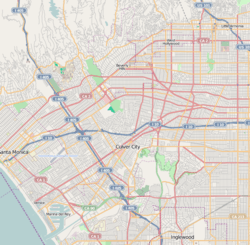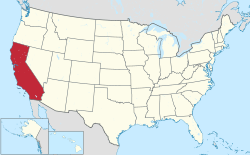Greystone Mansion
|
Doheny Estate/Greystone | |
|
Greystone Mansion, July 2008 | |
 | |
| Location | 905 Loma Vista Drive, Beverly Hills, California, U.S. |
|---|---|
| Coordinates | 34°5′31″N 118°24′6″W / 34.09194°N 118.40167°WCoordinates: 34°5′31″N 118°24′6″W / 34.09194°N 118.40167°W |
| Area | 46,000 sq ft (4,300 m2). |
| Built | 1928 |
| Built by | P. J. Walker and Company, San Francisco |
| Architect | Gordon Kaufmann |
| Architectural style | Tudor Revival |
| NRHP Reference # | 76000485[1] |
| Added to NRHP | April 23, 1976 |
Greystone Mansion, also known as the Doheny Mansion, is a Tudor Revival mansion on a landscaped estate with distinctive formal English gardens, located in Beverly Hills, California, United States. Architect Gordon Kaufmann designed the residence and ancillary structures, and construction was completed in 1928. The estate was a gift from oil tycoon Edward L. Doheny to his son, Edward "Ned" Doheny, Jr., and his family. Following the purchase of the estate by the city of Beverly Hills in 1965, the property became a city park in 1971 and was subsequently added to the National Register of Historic Places in 1976 as Doheny Estate/Greystone. The house and grounds are often used in filmmaking and television production. The house's descending staircase is one of the most famous sets in Hollywood.
Description
The 55-room, Tudor-style former residence, 46,000 sq ft (4,300 m2), is situated on 16 acres (6.5 ha) of land.[2] At the time it was built, it cost over $4 million and was the most expensive home built in California up to that time.[3]
History
On February 16, 1929, four months after Ned Doheny, his wife Lucy and their five children moved into Greystone, Ned died in a guest bedroom in a murder-suicide with his secretary, Hugh Plunket.[2][4] The official story indicated Plunket murdered Ned either because of a "nervous disorder" or inflamed with anger over not receiving a raise. Others point out that Ned's gun was the murder weapon and that Ned was not buried in Los Angeles' Calvary Cemetery, a Catholic cemetery, with the rest of his family, indicating that he had committed suicide. Both men are buried at Forest Lawn Memorial Park, Glendale, within a few hundred yards of each other. Both were involved in the trial of Ned's father in the Teapot Dome scandal.[5]
Ned's widow, Lucy, remarried and lived in the house until 1955, whereupon she sold the grounds to Paul Trousdale, who developed it into Trousdale Estates, and the mansion to Chicago industrialist Henry Crown, who rented the estate to film studios.[2][3] In 1963, Crown planned to subdivide the property and demolish the mansion. Beverly Hills stopped the demolition by purchasing the mansion in 1965.[2][4] The estate became a city park on September 16, 1971, and on April 23, 1976 it was added to the National Register of Historic Places.[2][3] The city leased the mansion to the American Film Institute, from 1965 to 1982, for $1 per year, hoping to get repair and upkeep work from the institute.[2][4]
Since 2002 The City of Beverly Hills has maintained a Web page for the Greystone Mansion park.[6] In addition to the city's restoration efforts, many local volunteers have been contributing to fundraising and restoration of the park, most notably the Friends of Greystone, who organize various showcase and garden events annually.[7]
Current use

Greystone is now a public park, and is also used as a location for special events, including the Beverly Hills Flower & Garden Festival.[2] The estate is popular as a filming location due to its beauty, manicured grounds and Beverly Hills location. Some productions contribute to the upkeep and renovation of the mansion. The 2007 film There Will Be Blood, loosely based on the life of Edward Doheny via the Upton Sinclair book Oil!, renovated the downstairs two lane bowling alley to include it in the film.[4]
In addition to the numerous events that take place at Greystone, the mansion plays host each year to Catskills West, a theater arts and drama camp run by Beverly Hills Parks and Recreation, from mid June to early August. The camp presents a play in the pool area twice during the summer. The mansion is also used for performances of the play The Manor written by Kathrine Bates, directed by Beverly Olevin and produced by Theatre 40 of Beverly Hills. The Manor takes place in a number of different rooms of the mansion. The audience is separated at certain times during the play to watch some scenes in a different order. The plot of the The Manor is a fictionalized account of the Doheny family, involving Doheny's involvement in the Teapot Dome scandal and his son's murder. The Manor has been performed every year at Greystone Mansion since 2002; it opens again in January, and 2016 marks a run of 14 consecutive years, making it one of Los Angeles' longest-running plays.
Greystone Mansion is also the location of "The Annual Hollywood Ball", where hundreds of celebrities gather each year for a grand fashion show, dinner and auction to raise money for the Pure Foundation, helping children in need around the globe. The million-dollar gathering also includes live performances by leading artists. Since 2010, an annual Concours d'Elegance car show has been held at the Greystone Mansion.[8]
Shot on location
- Alias (Season 5 Episode 12 "There's Only One Sydney Bristow")
- All of Me
- Arrow (TV series) Queen family's Mansion. Season 1 and 2.)
- Austin Powers in Goldmember
- The Amazing Race 17 (final pitstop and finish line in Season 17 Episode 12: "Hi. I'm Sorry. I'm in a Race")
- Bare Essence (used as the Marshalls' mansion)
- Batman & Robin
- The Beautician and the Beast
- The Big Lebowski
- The Bold and the Beautiful
- The Bodyguard
- Columbo (Season 2 Episode 4 "Dagger of the Mind")
- Dark Mansions (1986 film)
- Dark Shadows (1991 TV series) (used as Collinwood, the Collins family's mansion and estate)
- The Day Mars Invaded Earth (1963 film)
- Dead Ringer
- Death Becomes Her
- The Dirty Dozen
- The Disorderly Orderly (Jerry Lewis)
- Dollhouse (Season 1 Episode 10 "Haunted")
- Dynasty: The Reunion
- Entourage (Season 4 Episode 10 "Snow Job")
- Eraserhead
- Falcon Crest (Season 9 Episode 6 "God of the Grape")
- Flowers in the Attic
- Forever Amber
- Garfield: A Tail of Two Kitties
- Ghostbusters II
- Gilmore Girls (used as Chilton Academy, a prestigious preparatory school)
- Golden Child, The
- "I'd Do Anything for Love (But I Won't Do That)" (music video by Meatloaf)
- Indecent Proposal
- The Inheritance (1997)
- "It's Like That" (Mariah Carey music video)
- "I Want Love" (Elton John music video)
- Jumpin' Jack Flash (film)
- Knight Rider (Season 1 Episode 1 "Knight of the Phoenix")
- The Last Tycoon
- The Loved One
- Maryjane
- MacGyver (Season 1 Episode 12 Deathlock)
- Mercury Rising
- The Mentalist (Season 1 Episode 21 Miss Red)
- The Muppets (film) (Kermit's mansion)
- Murder, She Wrote (Season 2 Episode 6 Reflections of the Mind & Season 3 Episode 4 One White Rose for Death)
- National Treasure: Book of Secrets (Benjamin Gates and Abigail Chase's mansion. Seen when Conner, Abigail's date, drives her up to the front door, filmed in the courtyard of the Mansion)
- NCIS (TV series) (Season 8 Episode 17, Leona Phelps' mansion)
- Phantom of the Paradise
- Picture Mommy Dead
- The Prestige
- The Puppet Masters
- Remington Steele (Season 3 Episode "Blue Blooded Steele")
- Revenge (TV series)
- Rock Star
- Rush Hour
- The Social Network
- Simply Mad About the Mouse (used for "The Bare Necessities" music video with Harry Connick, Jr.)
- Spider-Man
- Spider-Man 2[9]
- Spider-Man 3
- Star Trek Into Darkness
- Stripes (outside courtyard)
- There Will Be Blood[4]
- The Trouble with Angels (various outside shots)
- The Vampire Diaries (promotional photoshoot)
- "We Belong Together" (Mariah Carey music video)
- What Women Want (Lauren Holly's wedding site)
- Winter Kills
- The Witches of Eastwick
- X-Men
- The Young and the Restless
References
- ↑ National Park Service (2007-01-23). "National Register Information System". National Register of Historic Places. National Park Service.
- 1 2 3 4 5 6 7 Mary McNamara, Such beauty and light could chase away the castle ghosts, Los Angeles Times, November 12, 2002
- 1 2 3 Timme, Katherine. "The History of Greystone". Retrieved 2007-12-27.
- 1 2 3 4 5 Hobart, Christy (2007-12-27). "At Greystone, there will be 'Blood' -- and bowling". Los Angeles Times. pp. F1, F4.
- ↑ Military Museum description of the Teapot Dome scandal
- ↑ Park Hours, news and special events
- ↑ Greystonemansion.org
- ↑ Osborne, Donald (February 2012). "2011 Greystone Concours d'Elegance". Sports Car Market. 24 (2): 44.
- ↑ Sanderson, Peter (2007). The Marvel Comics Guide to New York City. New York City: Pocket Books. pp. 62–63. ISBN 1-4165-3141-6.

